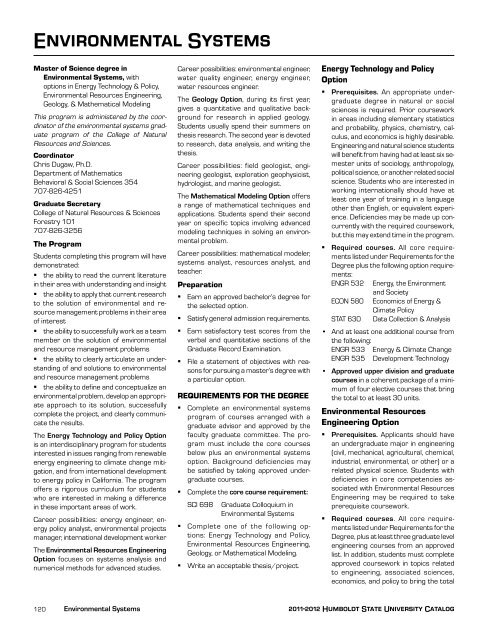2011-12 Academic Year - Bad Request - Humboldt State University
2011-12 Academic Year - Bad Request - Humboldt State University
2011-12 Academic Year - Bad Request - Humboldt State University
You also want an ePaper? Increase the reach of your titles
YUMPU automatically turns print PDFs into web optimized ePapers that Google loves.
Environmental Systems<br />
Master of Science degree in<br />
Environ men tal Sys tems, with<br />
options in Energy Technology & Policy,<br />
Environ men tal Re source s Engineering,<br />
Geology, & Mathematical Model ing<br />
This program is administered by the coordinator<br />
of the environmental systems graduate<br />
program of the College of Natural<br />
Resources and Sciences.<br />
Coordinator<br />
Chris Dugaw, Ph.D.<br />
Department of Mathematics<br />
Behavioral & Social Sciences 354<br />
707-826-4251<br />
Graduate Secretary<br />
College of Natural Resources & Sciences<br />
Forestry 101<br />
707-826-3256<br />
The Program<br />
Students completing this program will have<br />
demonstrated:<br />
the ability to read the current literature<br />
in their area with understanding and insight<br />
the ability to apply that current research<br />
to the solution of environmental and resource<br />
management problems in their area<br />
of interest<br />
the ability to successfully work as a team<br />
member on the solution of environmental<br />
and resource management problems<br />
the ability to clearly articulate an understanding<br />
of and solutions to environmental<br />
and resource management problems<br />
the ability to define and conceptualize an<br />
environmental problem, develop an appropriate<br />
approach to its solution, successfully<br />
complete the project, and clearly communicate<br />
the results.<br />
The Energy Technology and Policy Option<br />
is an interdisciplinary program for students<br />
interested in issues ranging from renewable<br />
energy engineering to climate change mitigation,<br />
and from international development<br />
to energy policy in California. The program<br />
offers a rigorous curriculum for students<br />
who are interested in making a difference<br />
in these important areas of work.<br />
Career possibilities: energy engineer, energy<br />
policy analyst, environmental projects<br />
manager, international development worker<br />
The Environmental Resources Engineering<br />
Op tion focuses on systems an al y sis and<br />
nu mer i cal methods for advanced studies.<br />
Career possibilities: environmen tal engi neer,<br />
water quality engineer, energy engineer,<br />
water resources engineer.<br />
The Geology Option, during its first year,<br />
gives a quantitative and qualitative background<br />
for re search in applied geology.<br />
Students usually spend their summers on<br />
thesis re search. The second year is devoted<br />
to re search, data analysis, and writ ing the<br />
the sis.<br />
Career possibilities: field geol ogist, engineering<br />
geologist, exploration geophysicist,<br />
hydrologist, and marine geologist.<br />
The Mathematical Modeling Option offers<br />
a range of mathematical techniques and<br />
applica tions. Students spend their second<br />
year on spe cific topics involving ad vanced<br />
modeling tech niques in solving an envi ronmen<br />
tal problem.<br />
Career possibilities: mathematical modeler,<br />
systems analyst, resources analyst, and<br />
teacher.<br />
Preparation<br />
Earn an approved bachelor’s degree for<br />
the selected option.<br />
Satisfy general admission requirements.<br />
Earn satisfactory test scores from the<br />
verbal and quantitative sections of the<br />
Graduate Record Examination.<br />
File a statement of objectives with reasons<br />
for pursuing a master’s degree with<br />
a particular option.<br />
REQUIREMENTS FOR THE DEGREE<br />
Complete an environmental systems<br />
program of courses arranged with a<br />
graduate advisor and approved by the<br />
faculty graduate committee. The program<br />
must include the core courses<br />
below plus an environmental systems<br />
option. Background deficiencies may<br />
be satisfied by taking approved under -<br />
graduate courses.<br />
Complete the core course requirement:<br />
SCI 698 Graduate Colloquium in<br />
Environmental Systems<br />
Complete one of the following options:<br />
Energy Technology and Policy,<br />
Environ men tal Re source s Engineering,<br />
Geology, or Mathematical Modeling.<br />
Write an acceptable thesis/project.<br />
Energy Technology and Policy<br />
Option<br />
Prerequisites. An appropriate undergraduate<br />
degree in natural or social<br />
sciences is required. Prior coursework<br />
in areas including elementary statistics<br />
and probability, physics, chemistry, calculus,<br />
and economics is highly desirable.<br />
Engineering and natural science students<br />
will benefit from having had at least six semester<br />
units of sociology, anthropology,<br />
political science, or another related social<br />
science. Students who are interested in<br />
working internationally should have at<br />
least one year of training in a language<br />
other than English, or equivalent experience.<br />
Deficiencies may be made up concurrently<br />
with the required coursework,<br />
but this may extend time in the program.<br />
Required courses. All core requirements<br />
listed under Requirements for the<br />
Degree plus the following option requirements:<br />
ENGR 532 Energy, the Environment<br />
and Society<br />
ECON 580 Economics of Energy &<br />
Climate Policy<br />
STAT 630 Data Collection & Analysis<br />
• And at least one additional course from<br />
the following:<br />
ENGR 533 Energy & Climate Change<br />
ENGR 535 Development Technology<br />
• Approved upper division and graduate<br />
courses in a coherent package of a minimum<br />
of four elective courses that bring<br />
the total to at least 30 units.<br />
Environmental Resources<br />
Engineering Option<br />
Prerequisites. Applicants should have<br />
an undergraduate major in engineering<br />
(civil, mechanical, agricultural, chemical,<br />
industrial, environmental, or other) or a<br />
related physical science. Students with<br />
deficiencies in core competencies associated<br />
with Environmental Resources<br />
Engineering may be required to take<br />
prerequisite coursework.<br />
Required courses. All core requirements<br />
listed under Requirements for the<br />
Degree, plus at least three graduate level<br />
engineering courses from an approved<br />
list. In addition, students must complete<br />
approved coursework in topics related<br />
to engineering, associated sciences,<br />
economics, and policy to bring the total<br />
<strong>12</strong>0 Environmental Systems<br />
<strong>2011</strong>-20<strong>12</strong> <strong>Humboldt</strong> <strong>State</strong> <strong>University</strong> Catalog

















